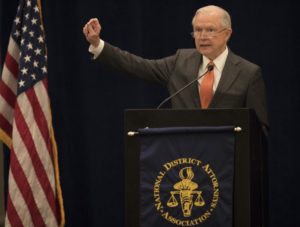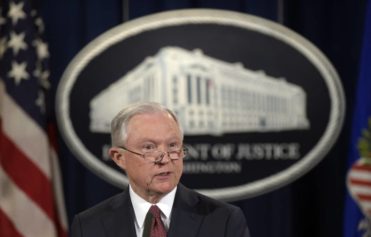
Attorney General Jeff Sessions (Jerry Holt/Star Tribune via AP)
NEW YORK (AP) — A federal appeals court in New York City is getting conflicting advice from the government over whether a civil rights law covers sexual orientation.
The Department of Justice told the 2nd U.S. Circuit Court of Appeals in court papers Wednesday that sexual orientation is not covered by Title VII of the 1964 Civil Rights Act. The law bans workplace discrimination based on race, color, religion, sex or national origin.
The Equal Employment Opportunity Commission enforces the law against private employers and says sexual orientation is covered, offering multiple theories on why that is so.
The Justice Department said its position is consistent with prior court rulings and the will of Congress, which has never explicitly included sexual orientation in the law. The papers were filed in a case brought by a skydiving instructor who said his employer violated Title VII by firing him in 2010 over his sexual orientation.
“The sole question here is whether, as a matter of law, Title VII reaches sexual orientation discrimination,” said the Justice Department, which is not a party in the case. “It does not, as has been settled for decades. Any efforts to amend Title VII’s scope should be directed to Congress rather than the courts.”
The entire 2nd Circuit is taking the rare step of considering the appeal after an appeals court panel in April upheld a lower-court decision finding sexual orientation discrimination was not covered by the law.
Justice Department lawyers wrote flatly that the EEOC in its court papers “is not speaking for the United States and its position about the scope of Title VII.” It added that the EEOC “is entitled to no deference beyond its power to persuade.”
The Justice Department arguments came the same day President Donald Trump said he was banning transgender people from military service.
Civil rights advocates took note.
David Dinielli, deputy legal director at the Southern Poverty Law Center, said Thursday that the brief demonstrates that the Trump administration “is determined to impose retrograde policies that roll back the civil rights of our most marginalized populations.”
James Esseks, director of the American Civil Liberties Union’s LGBT & HIV Project, said, “Fortunately, courts will decide whether the Civil Rights Act protects LGBT people, not an attorney general and a White House that are hell-bent on playing politics with people’s lives.”
Justice Department spokesman Devin O’Malley said the department’s arguments were consistent with its longstanding position and the holdings of 10 Courts of Appeals.
“The brief also reaffirms the department’s fundamental belief that the courts cannot expand the law beyond what Congress has provided,” he said. “This department remains committed to protecting the civil and constitutional rights of all individuals and will continue to enforce the numerous laws Congress has enacted that prohibit discrimination on the basis of sexual orientation.”
In its papers, the Justice Department noted that Title VII “prohibits employers from applying impermissible sex stereotypes to homosexual employees.”
It said, for instance, that gay and straight employees may invoke the law if they are subjected to gender-based stereotypes — such as “that a particular homosexual man is too effeminate — that cause them to be treated worse than similarly situated employees of the opposite sex.”


